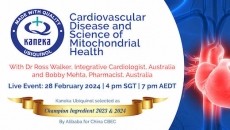Astaxanthin for heart health? Pilot study says carotenoid suppresses oxidative stress

The uncontrolled pilot study was conducted by researchers from Japan’s Juntendo University Hospital and Juntendo University Graduate School of Medicine.
According to them, the study had shed “several novel insights”, such as how oxidative stress was associated with impaired left ventricular systolic function.
This is in turn, can be improved by the consumption of astaxanthin, since blood oxidative stress – as expressed by the diacron reactive oxygen metabolites (dROM) level – had gone down after astaxanthin supplementation.
This effect, according to the researchers, was more significant in patients with high levels of baseline oxidative stress.
Along with the reduction in oxidative stress and improved left ventricular systolic function was a better exercise tolerance.
“The suppression of oxidative stress by astaxanthin administration may play a key role in improving left ventricular (LV) remodeling and dysfunction particularly in patients with reduced left ventricular ejection fraction (LVEF) and/or augmented oxidative stress,” the researchers said.
They also cited existing findings on how astaxanthin could increase mitochondrial respiration, adenosine triphosphate production, and consequently, LV systolic function.
The study was supported by AstaReal and grants from Japan’s Ministry of Health, Labour, and Welfare and the Ministry of Education, Culture, Sports, Science and Technology.
Study design
Nineteen patients were enrolled in the pilot study. All suffered from heart failure due to ischemic or non-ischemic cardiomyopathy and had treatment for at least six months.
Eventually, only data from 16 patients were valid for analysis.
Before starting on astaxanthin supplementation, their cardiac function, LVEF, plasma concentration of astaxanthin, and blood serum levels of the inflammatory markers were measured.
They also needed to perform the 6-min walk test and the distance walked was recorded.
Once the study commenced, all patients consumed a commercially available astaxanthin supplement containing 12 mg of astaxanthin, 40 mg of tocotrienol, and 30 mg of natural vitamin C (L-ascorbic acid 2-glucoside) once daily.
The astaxanthin was provided by AstaReal.
Their blood and urine sampling, echocardiography, and 6-min walk test were repeated at a follow-up visit 3 months after starting astaxanthin supplementation.
The key changes
The improvements in oxidative stress was most significant in terms of dROM levels.
In this case, the dROM levels dropped from 385.6 ± 82.6 U.CARR to 346.5 ± 56.9 U.CARR.
This is also accompanied by an improvement in LVEF, which increased from 34.1 ± 8.6% to 38 ± 10%.
No significant change was seen in other oxidative and inflammatory markers such as CRP, TNF-α levels though. There was also no decrease in urinary oxidative stress as seen from the 8-OHdG results.
As for the 6-min walking test, the distance walked increased from 393.4 ± 95.9m to 432.8 ± 93.3m.
However, the researchers cautioned that this could also be due to astaxanthin’s direct benefit on skeletal muscles, instead of an improvement in cardiac function alone.
Limitations
As this was an observational study without control groups, the researchers acknowledged that no causal relationship between astaxanthin supplementation and improvements in cardiac function was proven.
As such, they also pointed a possibility that the improvement in cardiac function could be due to a mechanism that was independent of oxidative stress suppression.
In addition, since the supplement used in the study contained tocotrienol and vitamin C which are antioxidants, these ingredients could also have played a role in reducing oxidative stress and improving cardiac function.
For future studies, the researchers have recommended a randomised, controlled, double-blind trial.
“Because no data regarding the effects of astaxanthin supplementation on oxidative stress status, cardiac function, and exercise tolerance in an actual patient population are available, we need a proof-of-concept study like this.
“A future randomized, controlled, and preferably double-blind trial with an adequately powered sample size is required to draw a solid conclusion,” they said.
Source: Nutrients
Effects of 3-Month Astaxanthin Supplementation on Cardiac Function in Heart Failure Patients with Left Ventricular Systolic Dysfunction-A Pilot Study
https://doi.org/10.3390/nu12061896
Authors: Takatoshi Kasai and et al



















